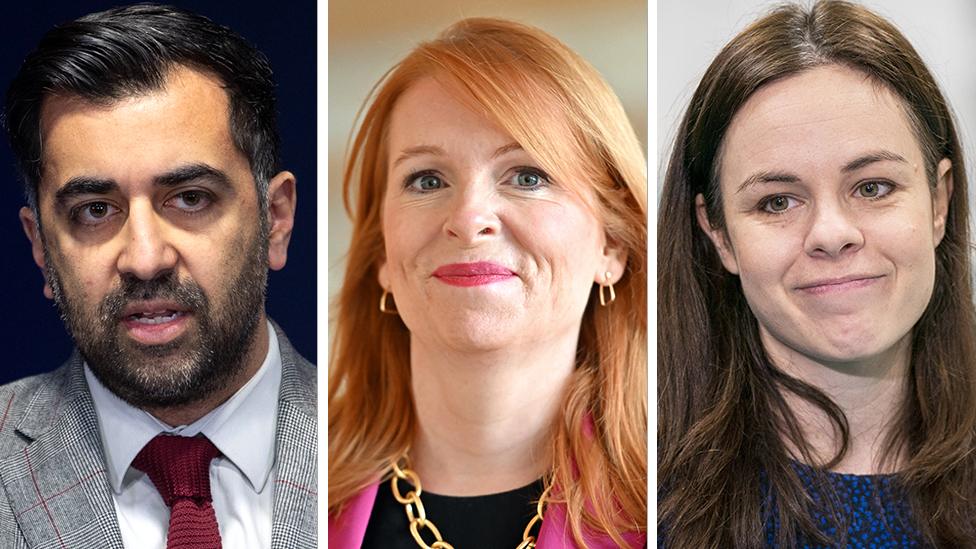SNP leadership: The perils of mixing politics and faith
- Published
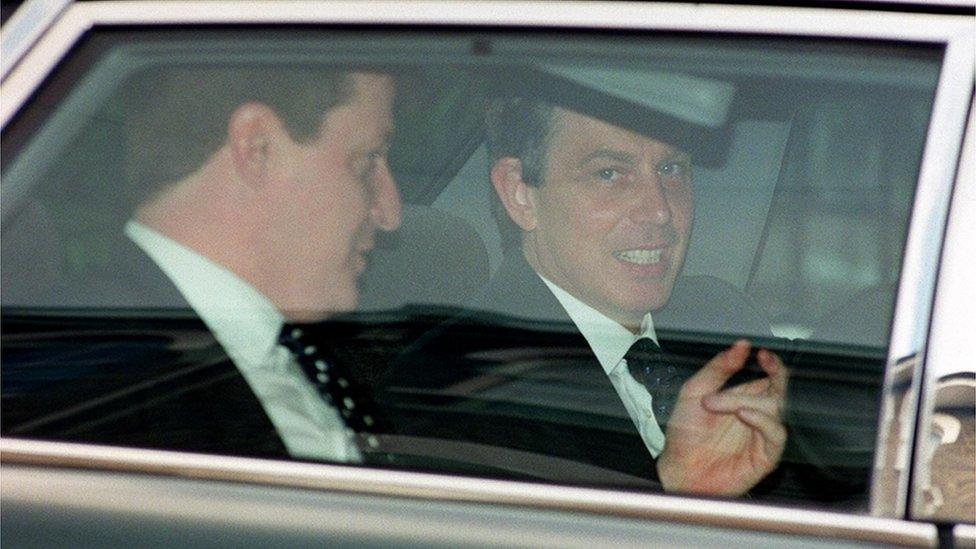
Tony Blair and Alastair Campbell after the Labour Party swept to victory in 1997
"We don't do God."
That, famously, was how Labour spin doctor Alastair Campbell intervened to stop his boss, Tony Blair, from answering a journalist's question about religion.
Mr Campbell later insisted, external he had simply been trying to bring a lengthy interview to a close, but the quote has nonetheless become emblematic of the perceived perils of mixing politics and faith.
Had Kate Forbes taken Mr Campbell's advice, her campaign to become Scottish National Party leader and first minister of Scotland might not be struggling to get off the ground.
Instead, her uncompromising stance on the morality of gay marriage has prompted key backers to withdraw their support.
Same sex marriage has been legal in Scotland since 2014, the same year it was legalised in England and Wales. Northern Ireland followed in 2020.
Polling expert Prof Sir John Curtice said the last comprehensive opinion poll on the issue in Scotland was conducted in 2014, just before the law was changed.
At that time the Scottish Social Attitudes Survey suggested that more than two-thirds (68%) of the Scottish public believed that same-sex couples should have the right to marry, up from just two-fifths (41%) of the population in 2002, a significant and rapid shift in a little over a decade.
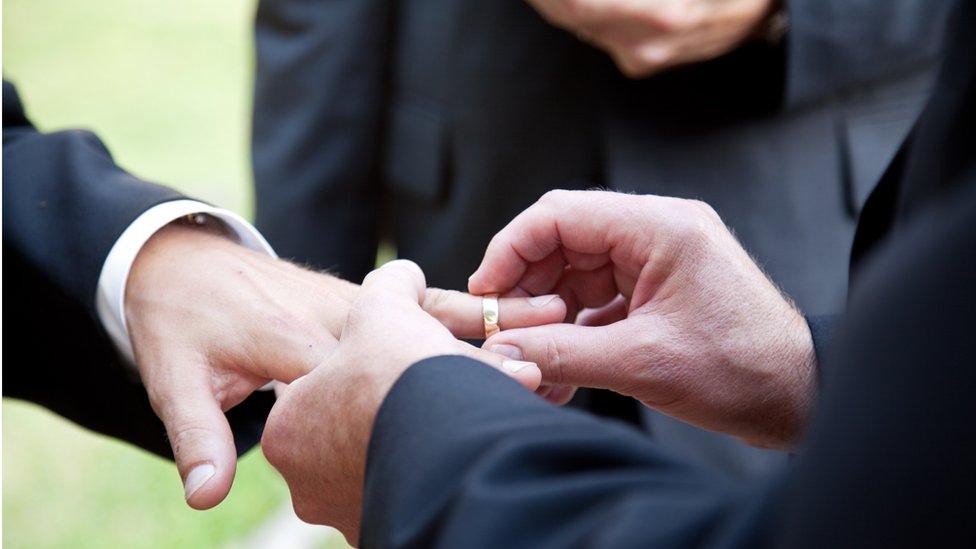
In 2014, three-quarters of SNP supporters indicated that they were in favour of gay marriage, along with two-thirds of Labour supporters and just over half of Conservative voters.
Prof Curtice, of the University of Strathclyde, added that more recent evidence suggested support for gay marriage "may be even higher now".
So why was Kate Forbes so bold about stating views which are apparently so unpopular?
Perhaps, as a woman of deep faith, she felt it was her obligation to do so - that the Bible's teachings could not be dismissed and were not a matter for negotiation.
In that sense, argue her supporters, she could be said to have demonstrated integrity and honesty.
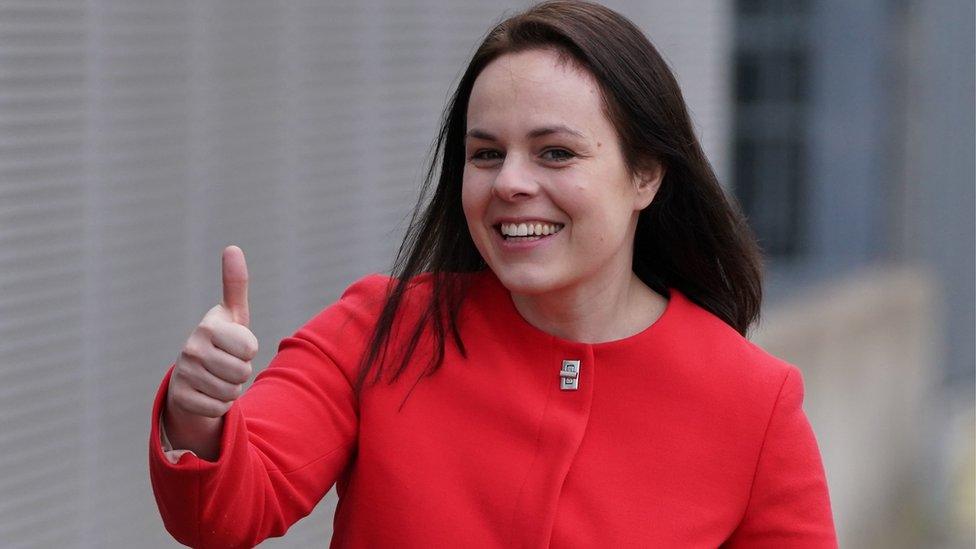
Kate Forbes arriving at BBC Scotland's Pacific Quay after announcing her SNP leadership bid
On Monday, Ms Forbes told me that, as a member of the presbyterian Free Church of Scotland, she practises "the teachings of most mainstream religions - whether that's Islam, Judaism, Christianity - that marriage is between a man and a woman".
She went on to insist that as a "servant of democracy" she would defend the legal right to gay marriage "to the hilt", even though she would have voted against the bill, external which codified that right had she been an MSP in 2014.
Angus Brendan MacNeil, an SNP MP, whose constituency of Na h-Eileanan an Iar (Western Isles) includes many Free Church parishioners, praised Ms Forbes for giving "a very frank and expansive answer - a 'warts and all' answer, if you like".
It was unfair, he suggested, that people had "concentrated on the warts" even though "the important thing she said was there was no rolling back of rights".
However, Mr MacNeil stopped short of actually affirming his support for her candidacy.
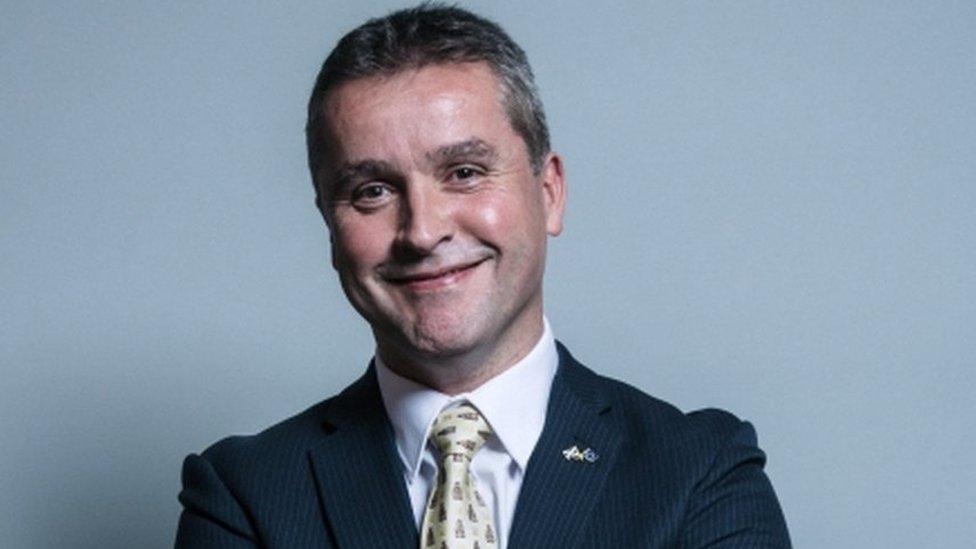
Angus MacNeil is the MP for the Western Isles
Former Liberal Democrat leader Tim Farron might well know how she is feeling.
Mr Farron, who led the party between 2015 and 2017 but resigned after being repeatedly challenged about his views on gay relationships, told BBC Radio Scotland's Drivetime programme that Ms Forbes had been "genuinely very brave" in setting out her stall.
He added: "I think you ought to be very careful if you think that you should exclude people from high office because of their faith, and indeed it does become a blind spot for people who would otherwise call themselves liberals.
"It's even more silly if you exclude the best person for the job because of that."
So is Ms Forbes being demonised by an illiberal media? Does she have a point that her denomination - which is often described as socially conservative or even fundamentalist - is not alone in its teachings?
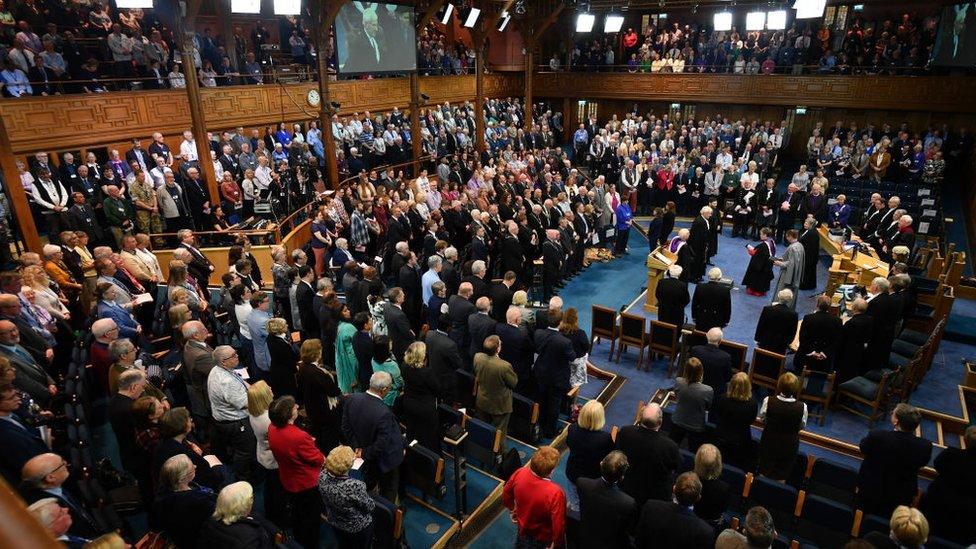
The General Assembly of the Church of Scotland has been held at the Mound in Edinburgh almost every year since 1560.
The Church of Scotland is generally regarded as more liberal, but even so it was only last year that the Kirk's General Assembly voted to allow clergy to conduct same-sex marriages.
In 2021, Pope Francis indicated that same-sex couples should be allowed to have "civil unions", but the Roman Catholic Church later clarified that priests could not, in fact, bless same-sex unions.
According to Mona Siddiqui, professor of Islamic and Interreligious Studies at the University of Edinburgh, scripture across most religious traditions, including Islam, recognises marriage as between a man and woman.
"Interpretation of what the Quran says about same-sex relations continues to divide many Muslims," she told the BBC.
"It's not something faith speaks out against, it just isn't even considered. That means it's down to communities and legislation to introduce something like gay marriage."
'Rings a little hollow'
For Ms Forbes's staunchest critics, her views on the subject amount to saying 'I will stoutly defend a right that I would have fought to prevent you from having.'
Eilidh Douglas, a lawyer and commentator who supports independence for Scotland, told BBC Scotland's The Nine that the MSP for Skye, Lochaber and Badenoch's assurance that she would protect gay rights "rings a little hollow."
The first minister, she said, sets the tone for public debate, for what is and isn't acceptable "in modern day Scotland."
"When someone says that they don't support equal marriage, they don't support my right to be married to my wife...the inescapable truth of that is that they believe that my relationship with my wife is somehow lesser."
She added: "We deserve to be represented by a first minister and by a government who fundamentally believe in the equality and dignity of all of Scotland's citizens."
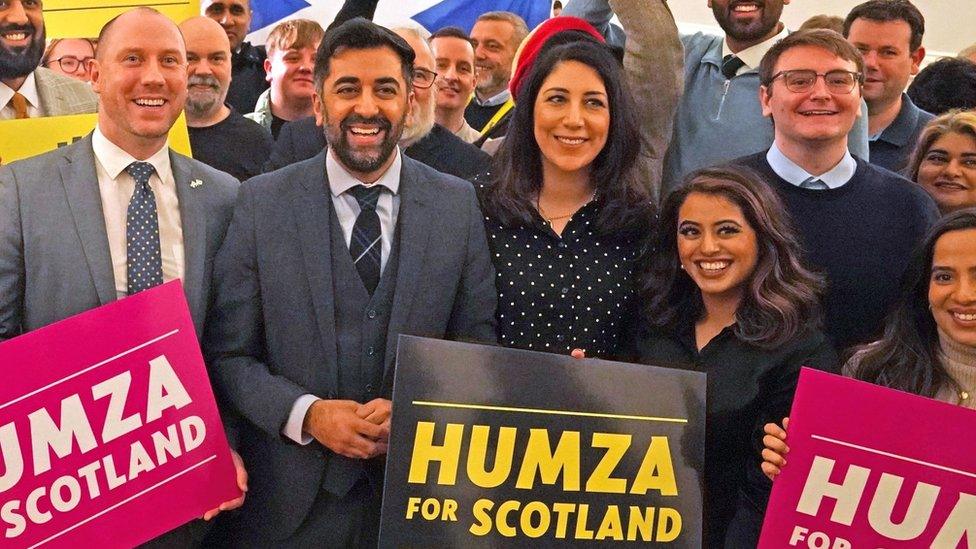
Humza Yousaf with supporters at his campaign launch on Monday
One of Ms Forbes's rivals for the leadership, Humza Yousaf, is a Muslim, but he insists his faith does not dictate how he legislates.
And although eyebrows have been raised about his missing the final Holyrood vote on gay marriage in 2014, the MSP for Glasgow Pollok said there was evidence that he supported the measure then, and now.
The SNP MP for Livingston, Hannah Bardell, praised Mr Yousaf's boldness in discussing the issue in his own community as a "true mark of leadership".
Ms Bardell added she didn't feel she could come out as a lesbian until "after equal marriage became law", in part because she didn't "feel like I could be a whole person and a whole member of society".
The third contender, Ash Regan, has not yet been available for interview by the BBC, despite repeated requests, but a source close to her campaign said she "fully supports equal marriage".
The source added that Ms Regan sympathised with gay people who for many years "were unable to show their commitment of love to each other" and, describing her as the underdog in the race, said she hoped to restore power to party members so they could play a part "in shaping the vision of the SNP's future".
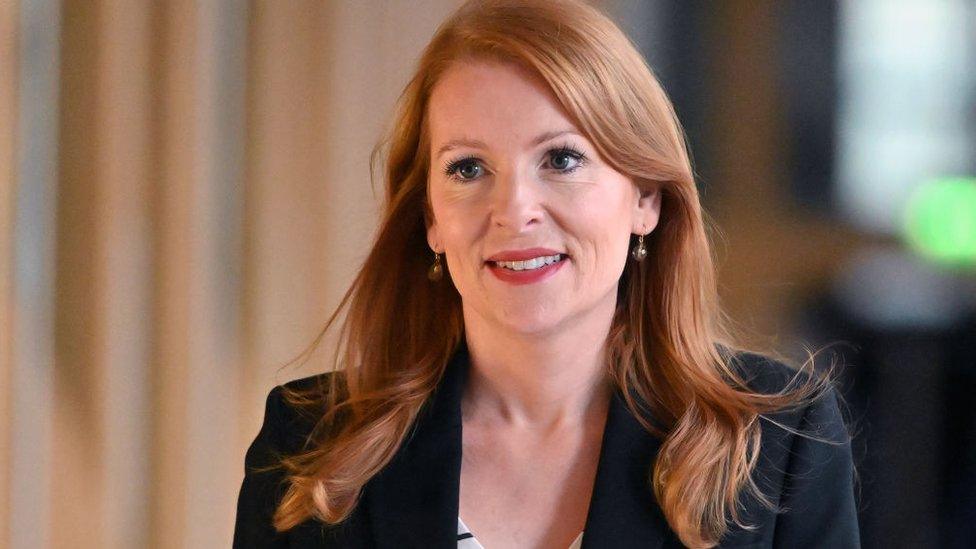
Former Community Safety Minister Ash Regan is best known for quitting her government post last year in protest over gender reform legislation
Also speaking on The Nine, Scotland editor of the Spectator, and Times columnist, Alex Massie said the furore shouldn't have come as a surprise.
"After all," he said, "it is well known that Kate Forbes is a member of the Free Kirk, and there are certain things that logically, implicitly flow from that."
"Her faith is, if you like, the bedrock of her life. I think if you were to ask her to choose between membership of the Free Church and membership of the SNP, and she had to sacrifice one of those things, she would sacrifice her membership of the SNP."
'Belief humbly held'
Stephen Noon, chief strategist for the Yes Scotland campaign in 2014, and now studying for a PhD in Divinity at the University of Edinburgh, said it was possible for politics and religious belief to co-exist.
"Belief humbly held," he said, "is very different from belief held in absolute terms - belief wielded as a weapon against people."
Mr Noon cautioned against the danger of absolutism producing polarised debate, arguing: "I think that happens when you have people standing on both sides, 100 per cent sure of their correctness, and that's not the reality of the world we live in."
Of course the modern world in which we live now and the ancient world in which the major religions emerged are very different places.
"The language of human rights is almost like the new religion, where individual rights are the main value determining how we want to govern society and move it forward," said Prof Mona Siddiqui.
"This poses a real challenge for people, including politicians, who try to argue that their cultural or religious belief should trump others' human rights and the progress Scotland has made in this area."
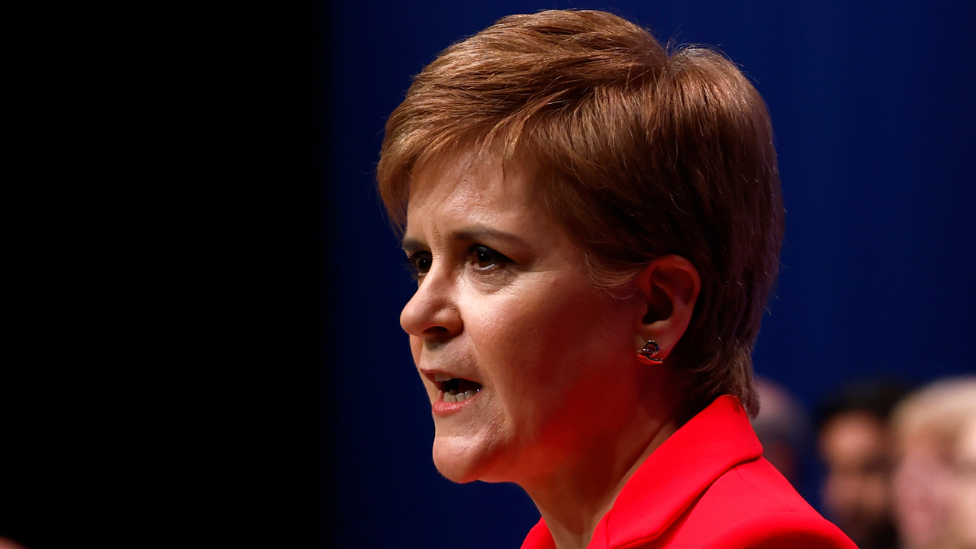
Nicola Sturgeon announced she was standing down as SNP leader last week
This has been a damaging episode for the Scottish National Party.
The outgoing leader Nicola Sturgeon has often been keen to promote the SNP as a socially progressive force.
"I think my views on these things accord with the views of my party, and I don't see that changing," she said, pointedly, on Tuesday night.
"People look to the SNP as the government of Scotland to be very clear in its values about the kind of Scotland we are: fair, inclusive, open, tolerant," she added.
But above all else, of course, the party is dedicated to constitutional change, and that has resulted in some uneasy alliances over the years, under the banner of independence.
In some respects, this affair has challenged that notion of the SNP as a broad church.
- Published20 February 2023
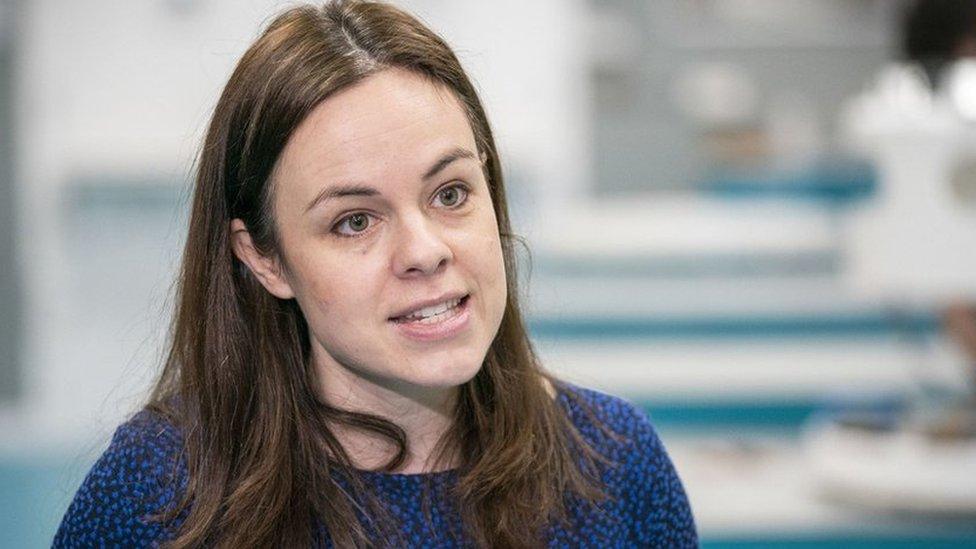
- Published20 February 2023
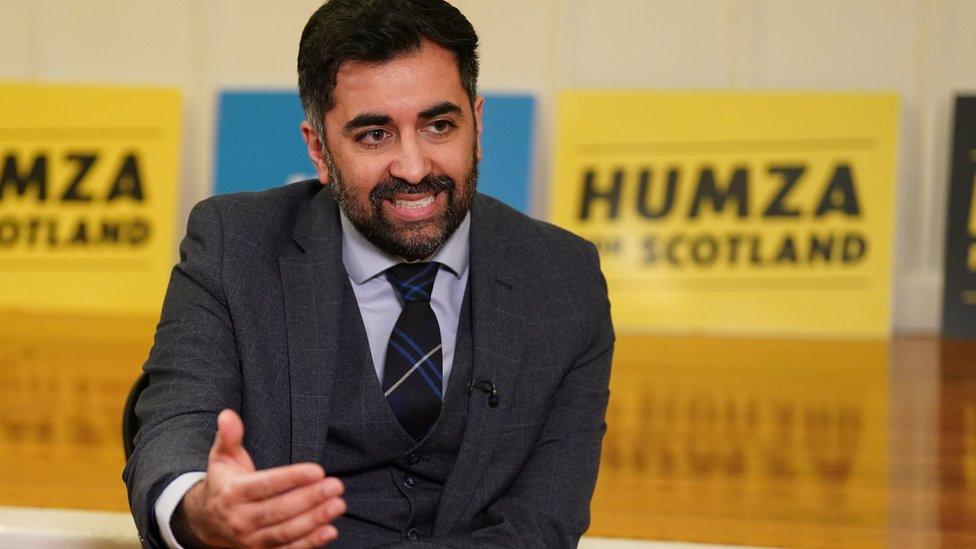
- Published24 February 2023
